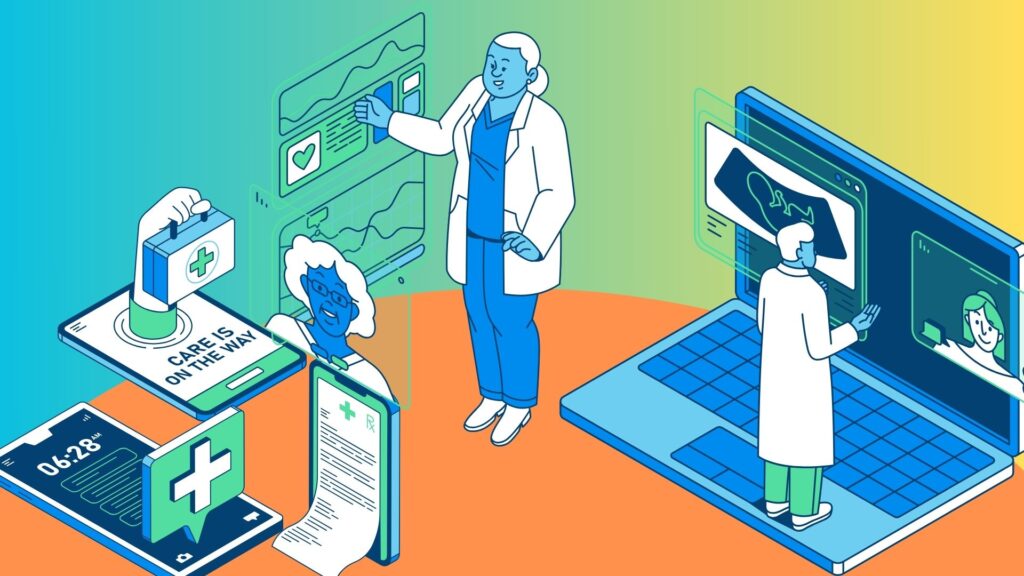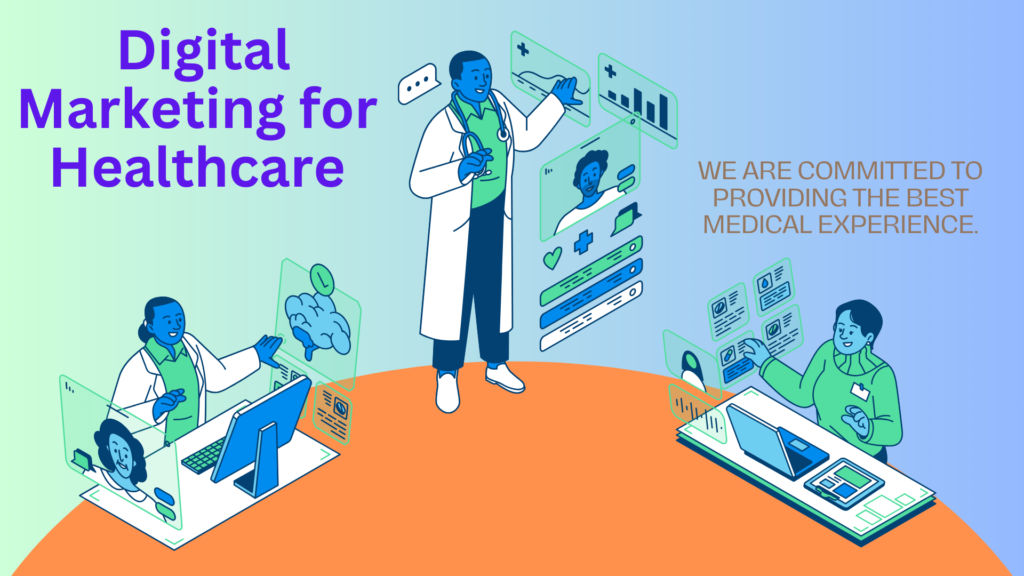Digital marketing for healthcare is on an upward trend. Consider that healthcare providers will devote more than half of their overall advertising budget on mobile devices in 2025. That is expected to rise in 2025, and it is easy to understand why. With a strong digital strategy, healthcare organizations may reach highly targeted audiences and increase patient engagement faster and more cost-effectively than conventional media such as print or television.

As the internet and mobile audiences expand, great tactics of digital marketing for healthcare may reach more patients in an efficient and effective manner. In this piece, we’ll look at some of the methods and ideas that healthcare providers and marketing teams should consider when developing a unified digital strategy. We also look at the role of existing and developing marketing technologies in healthcare organizations, and how they may deliver useful data insights throughout the patient experience.
Here is, of course, privacy concerns about the acquisition of patient data. As a result, we also address how marketing team may successfully handle these difficulties while remaining compliant with applicable laws and regulations. But first, we’ll explain what digital marketing for healthcare is and why it’s crucial.
What is Digital Marketing for Healthcare?
Healthcare organizations utilize digital platforms such as sponsored search and social media to reach out to their target consumers. In recent years, digital marketing has grown and matured significantly, allowing marketers to engage with audiences online and via mobile using a variety of tactics and strategies such as paid search ads, digital display ads, email campaigns, pay-per-click ads, search engine optimization (SEO), and influencer marketing.

If they have not already done so, healthcare organizations should increase their digital marketing efforts. According to Statista, consumers in the United States will spend an average of more than 9.0 hours per day on digital channels by 2024. That means digital is one of the most effective avenues for reaching customers. Other popular channels include.
One of the primary benefits of digital marketing for healthcare is that it may be less expensive to implement than paid and traditional marketing methods. A digital marketing approach can also be more effective and reach a larger audience than free marketing tactics.
The Role of Digital Marketing in Healthcare
Healthcare consumers are turning to internet services for speed, ease of communication, and convenience. According to Becker’s Hospital Review, “Hospitals are dealing with consumers who are remarkably smart, demanding transparency and two-way communication from their healthcare providers. To appeal to this new type of client, healthcare marketers must employ novel digital marketing strategies.
Why is Healthcare Digital Marketing Necessary?
Healthcare is a highly competitive industry, with more than 900,000 organizations fighting or their piece of a $4.5 trillion pie. Digital marketing is a must for elevating healthcare brand awareness and enhancing a provider’s ability to stand out from the crowd.

Healthcare providers must adapt to the evolving online landscape to connect with patients effectively. Digital marketing for healthcare is no longer optional. it is essential for enhancing patient engagement, brand visibility, and trust.
Healthcare likewise has a consumer perception issue. According to a Salesforce poll from 2022, 54% of customers feel that healthcare providers prioritize their own interests (expansion, revenue) over patient requirements (care). A successful strategy of digital marketing for healthcare can assist to shift that view. There are three causes.
. Increase online presence
. Patience education and awareness
. Targeted marketing for patience acquisition
. Reputation management
. Cost-Effective outreach
. Improve patience engagements
Healthcare SEO (Search Engine Optimization)
search engines generate three times the number of visitors to hospital websites as other sources. The survey also discovered that 52 percent of people who investigate hospitals on a mobile device make an appointment. As a result of customers’ significant use of search engines to identify facilities or enquire about their health, healthcare marketers must take search engine optimization (SEO) in mind when developing comprehensive digital strategies.
Healthcare marketers can help search engines recognize and rank their organic content, such as blog posts, patient testimonials, and informative images or videos, by tagging pages with relevant keywords, writing informative page descriptions, and creating strategic HTML titles, among other techniques. With the development of voice-activated search, marketers should ensure that their content is likely to match the distinctive language and structure of these enquiries.
Furthermore, because mobile searches account for more than half of all web searches, your site must be built for easy mobile navigation. This includes optimizing web sites for mobile search and browsing, prioritizing dynamic design, and ensuring quick load times.
Content Marketing:
Good content is the key to effective digital marketing for healthcare. To advance healthcare digital marketing, marketers must have a good content strategy. To do this, marketers must first identify the demands of their target audience and then produce relevant content on healthcare themes that appeal with them. They must also ensure that the content is of superior quality.
Patient engagement may be increased by creating well-crafted and useful information. Consider the example of a blogging approach. Providing instructional and entertaining material in relevant blog articles can help a healthcare practice increase website traffic. Over time, this might result in more recommendations, planned visits, and phone calls asking for information about services.
Today’s healthcare marketers must also consider improving their content creation skills, whether for a website or a social media outlet. Rich, interactive material like video and graphics, enabled by improved bandwidth and data capabilities on PCs and smartphones, is driving more conversions.
Your content strategy should also prioritize personalization. Digital marketing for healthcare is extremely personal, so why wouldn’t your content approach reflect this? No two patients are identical. One patient may require emergency surgery or therapy, while another seeks advise on how to live a healthier lifestyle. Highly personalized campaigns avoid the cookie-cutter approach to digital marketing for healthcare, which can fail to connect — and even alienate—target consumers.
Using the entire range of conversion data from online and offline encounters with patients allows you to simply obtain the insight required to personalize campaigns. If you use a conversation intelligence platform like Digitalswatantra, you already have raw data from phone calls to assist guide your content strategy.
Perhaps you discover that a significant number of callers have enquired about COVID-19 booster injections, and you’ve also seen an uptick in social media posts regarding the subject. You’ll want to target your next digital marketing material to consumers looking for information about the booster. So, you may opt to make a brief internet video explaining what the new booster protects against, as well as how, where, and when individuals can get the injection.
Email Marketing for Patience Engagement:
Email Marketing is another powerful tool in the digital marketing for healthcare. By creating a targeted email list, you can keep your patients informed about important updates, new services, or health tips. Email is another key component of an efficient strategy of digital marketing for healthcare. It’s a low-cost type of patient outreach that enables for personalization (another way to leverage phone and internet conversion data).
Newsletter-style emails can include compelling material to bring patients up to date on new therapies, clinical drug studies, and even staff changes, as well as wellness and good living tips.
There are several email systems available to assist healthcare marketers create intriguing and engaging email messages on a large scale, like Digitalswatantra and MailChimp. These platforms often provide drag-and-drop editing features to assist you create email content, as well as tools for previewing and testing material.
Produce Video Content:
Video marketing is emerging as the next important way to engage customers, particularly in healthcare. A research by eye view Digital found that adding video on landing pages may improve conversions by up to 80%. Because healthcare is an inherently human, narrative-rich sector, video may have enormously potent applications. Patient tales are brought to life via dynamic narrative and images, allowing new site visitors to build trust in the organization even before scheduling an appointment.
Furthermore, video is an excellent medium for conveying information about complicated health conditions or diseases in a simple, understandable visual manner. It may be used to provide critical information about community health initiatives, clarify post-surgical recovery protocols, and educate the public about overall wellbeing.
While video creation is time- and labour-intentive, it is well worth the investment, especially given the level of saturation in printed medical literature. It’s difficult to write a unique, high-ranking blog post regarding asthma symptoms, for example, when there are so many articles and blog posts on the internet that provide the same exact material. A video, on the other hand, has considerably greater potential for dynamic interaction. Even if the topic is the same, a well-produced video will most likely outperform a blog article in terms of traffic and conversions.
Engage Via Social Media:
Social media may be utilized to connect with patients, help doctors, and enhance population health outcomes. Participating in community forums, networking, and spreading population health information are all potential healthcare social media marketing methods.
A strong social media presence is also beneficial in attracting patients. A recent study discovered that 66 percent of customers’ decisions to obtain treatment at a healthcare institution are heavily impacted by that provider’s social media connections, indicating that users trust healthcare organizations that interact online. Physicians may also utilize social media networks to connect, exchange expertise, and work together, thereby enhancing patient outcomes.
It is critical that health systems do not isolate themselves into a strictly organic social media approach. Paid social media advertising is also quite beneficial, and it may be a more effective approach to target and reach the specific demographic your organization is searching for. Paid social advertising, like all other marketing, must be designed using research and historical data. When effective, they are a wonderful tool for re-engaging existing and new patients who have already visited your website or are looking for the services your organization provides.
Pay-Per-Click (PPC) Advertising in Healthcare:
Another tactics of digital marketing for healthcare to consider is PPC advertising. These are highly focused sponsored adverts that may be displayed on Google and other search engines, as well as social media channels such as Facebook, Google, YouTube and Instagram, and other digital platforms.
The advantage of PPC advertisements is that they may be quite cost-effective. As the name implies, you only pay when someone clicks on the ad. Unlike conventional advertisements, where you pay a huge number to position an ad in front of a wide audience without knowing if it will result in leads, your PPC ad spend only grows when you receive leads. This has the extra benefit of getting your message in front of a pre-qualified lead – someone who has demonstrated interest in your healthcare product by clicking on the ad. This maximizes ROI and helps spread your valuable marketing money further.
To ensure the effectiveness of your PPC campaign, you should use all available tools to get the message perfect. Your digital marketing team is most likely using online conversion data to guide automated bidding tactics, ensuring that you aren’t overpaying for Google ads.
Bidding can be further optimized by including data from offline conversions. How? If you utilize a conversation intelligence platform like Digitalswatantra, you’ll already have information on which search terms are generating phone call conversions. All you have to do is feed that data into Google Ads to assist construct a more accurate bidding strategy.
Online Reputation Management (ORM) for Healthcare
Online Reputation Management (ORM) is crucial for healthcare providers to build trust and credibility in a highly competitive digital landscape. With patients relying on online reviews, ratings, and testimonials to choose doctors and hospitals, maintaining a positive reputation directly impacts patient acquisition and retention. Effective ORM includes monitoring and responding to patient feedback on platforms like Google, and Health grades, ensuring transparency and trust. Engaging with patients through social media, managing negative reviews professionally, and sharing valuable healthcare content further enhance credibility. A strong online reputation not only boosts visibility but also fosters long-term patient relationships, ultimately contributing to the success of healthcare professionals and institutions.
The Future of Digital Marketing for Healthcare
Digital technology evolves quickly. As a result, healthcare organizations and their marketing teams face both challenges and possibilities. Only two years ago, Google switched to mobile-first indexing for search. Is this the end of personal computers? Not yet. However, due to significant changes in the availability and usage of emerging technologies, healthcare firms must be clever and nimble in order to position themselves for the future.
Healthcare personnel are now adjusting to a new technology that might help them perform quicker and more efficiently: artificial intelligence (AI). Artificial intelligence has the ability to alter all aspects of healthcare, including administration, research, operations, and patient care. And, in other areas, like data collecting and analysis, AI is already driving change and increasing productivity.
The capacity of AI to gather, compile, and assess data from online and offline encounters on a large scale is transforming how healthcare marketers develop digital marketing campaigns, personalize outreach, and segment their clients.
